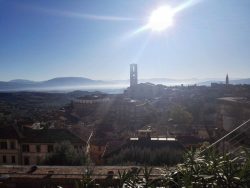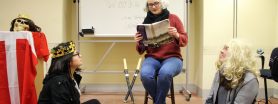 Students visit and tour Radiophonica
Students visit and tour RadiophonicaStaff from Radiophonica, a local WebTV and WebRadio producer, came to the Umbra Institute on Tuesday to share their work with the participants of Umbra’s Journalism & Communications Club. Radiophonica is a member of the National Association of College and Student Radio and regularly works with more than 90 European college radios, as well as a number of stations around the world. The Radio Manager, Rossella Biagi was very open to questions as she shared the history of Radio in Italy, the station’s format, how the station is structured, and how radio shows are created.
Students also received a brief lesson on the culture of news reporting in Europe. Radiophonica’s News Video Editor, Nicola Palumbo, presented the fact that even countries that are often stereotyped into similar cultures are actually quite dissimilar, especially when it comes to reporting style. Focus was placed on Spanish, French, and Italian journalistic cultures, which exhibit stark differences.
Umbra students then met with Radiophonica staff on Thursday afternoon to tour the station’s facilities, and to learn more about opportunities to participate in the production of their own WebTV or WebRadio shows.
Contact the Umbra Voice Journalism & Communications club for more information about Radiophonica or upcoming workshops and events.


 The class gathers in front of the Broccatelli Cheese Factory
The class gathers in front of the Broccatelli Cheese Factory As many have expressed concern for the Umbra community, we would like to report that the city of Perugia and the Umbra Institute were unaffected by this morning’s earthquake in Italy.
As many have expressed concern for the Umbra community, we would like to report that the city of Perugia and the Umbra Institute were unaffected by this morning’s earthquake in Italy. A past theater performance at Onaosi Theater in Perugia
A past theater performance at Onaosi Theater in Perugia
 Umbra welcomes Spring 2017 students
Umbra welcomes Spring 2017 students


